The latest issue of "Khurasan Ghag [Voice of Khurasan]," the Pashtu-language magazine published by Al-Azaim Foundation, which is the media arm of the Islamic State's Khurasan Province (ISKP), vows to free Pakistani neuroscientist Dr. Aafia Siddiqui, who is serving an 86-year jail term in a U.S. prison for trying to kill American military personnel in Afghanistan, and criticizes Islamist forces for lauding democracy, rather than shari'a, by celebrating Turkish President Recep Tayyip Erdoğan's re-election. The latest issue of the magazine, Issue 23, is dated Dhul Qa'dah 22, 1444, in the Hijri calendar, which corresponds with June 11, 2023.
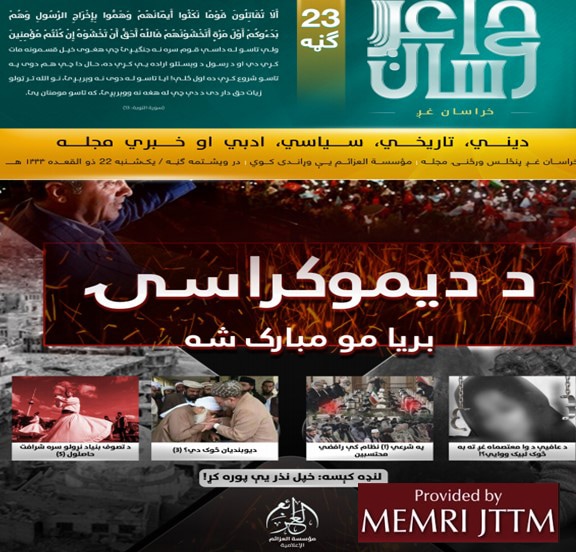
The cover of Issue 23 of the magazine.
Issue 23 of the magazine was released via social media on June 11, 2023 and has 77 pages. It is divided into religious, historical, political, literary, and news sections.
The magazine's cover article, sarcastically titled "Congratulations On The Victory Of Democracy," discusses the recent re-election of Turkish President Recep Tayyip Erdoğan. The article reports that Erdoğan said in a speech to a large crowd of people in Istanbul that "Today was the victory of the people and democracy has won again" and that Islamic scholars have declared elections to be blasphemy.
"Elections are a blasphemous process and constitute the foundation of the democratic system built against the Islamic system," the article says, adding: "Despite the fact that the election is a blasphemous process, and the republic is blasphemous, some hypocritical Muslims in the name of Islam prayed for the success of this blasphemous process and organized celebrations and congratulated [one another] on it."
The Pashtu magazine has two main political and religious parts. The political part has five articles: "Achieving Honor By Destroying The Foundation Of Sufism"; "Who Will Listen To The Voice Of Aafia?"; "The Rawafidh [rejectionist, a pejorative term for Shi'ite] Ombudsman In The Shari'a System?"; "Who Are The Deobandis (3)"; and "Momineen (Believers) Are Winners." The religious part has two articles: "Forms Of God's Support (2)"; "The Greatness And Importance Of The Virtues Of The Quran (2)." Finally, the magazine has a story titled "He Fulfilled His Vow!"
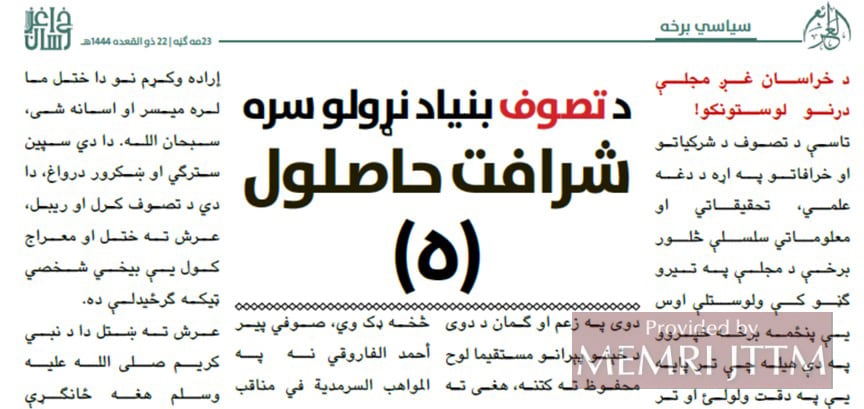
An article questions Sufism and declares it to be anti-Islamic.
Some of the articles are parts of ongoing series. On Page Nine, the fifth article of a series criticizing Sufism as polytheistic and anti-Islamic appears and is titled "Achieving Honor By Destroying The Foundation Of Sufism."
One of the major articles is titled "Who Will Listen To The Voice Of Aafia?" It is about Dr. Aafia Siddiqui, the U.S.-educated Pakistani neuroscientist serving an 86-year jail term in the United States for trying to kill American military personnel in Afghanistan. Pakistani writers accused the CIA and Pakistani Inter-Services Intelligence (ISI) of jointly abducting her from Pakistan and taking her to Afghanistan, where she was arrested by the U.S. military.
"Oh, Islamic Ummah! Who do you hope will free thousands of sisters like Aafia from the prisons of unbelievers and tyrants?" the article says, declaring that it is the Islamic State's duty to free her from the American prison. "Yes! It is our duty and the duty to purify each of our believing captive sisters who are in the East and in the West. Is your hope in the Taliban militants who are afraid even of mentioning Muslim sisters? Only the Islamic State can release the Muslim sisters," the article says.
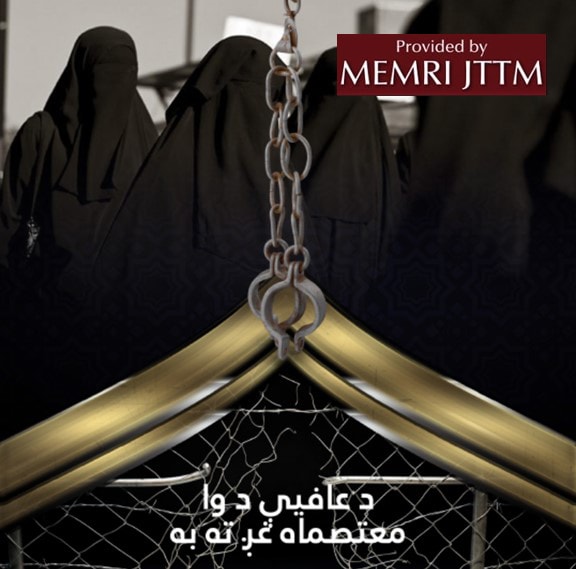
An article says Muslims must not hope for the Taliban to free Aafia Siddiqui
A lead article titled "The Rawafidh [rejectionist, a pejorative term for Shi'ite] Ombudsman In The Shari'a System?" accuses the Islamic Emirate of Afghanistan of allowing Shi'ites to serve in the Taliban government in Afghanistan. Referring to Taliban leader Mullah Hibbatullah Akhundzada, it says: "The leader of the Taliban, Hibbatullah, not only called the Rawafidh brothers, but also appointed them as provincial leaders and appointed them as inspectors, among other positions," the article observes.
"From the actions of the Taliban, it has been proven that the Taliban and Rawafidh share similar beliefs. To us [ISKP], both groups, the Taliban and the Rawafidh are the same based on their agreement to shirk [idolatry], and both of them are unbelievers," it declares.
The article further says: "The Taliban call themselves Muslims; they consider Hibbatullah the Emir-ul-Momineen [Leader of the Believer]; they consider all their gunmen mujahideen; they consider the Qatari system an Islamic system and [man-made] constitutional law as shari'a law; and they also claim that 'we expelled the unbelievers by force.' But they do everything [in Afghanistan] with the help of unbelievers. Their system is not Islamic, but their system is the Qatari system."
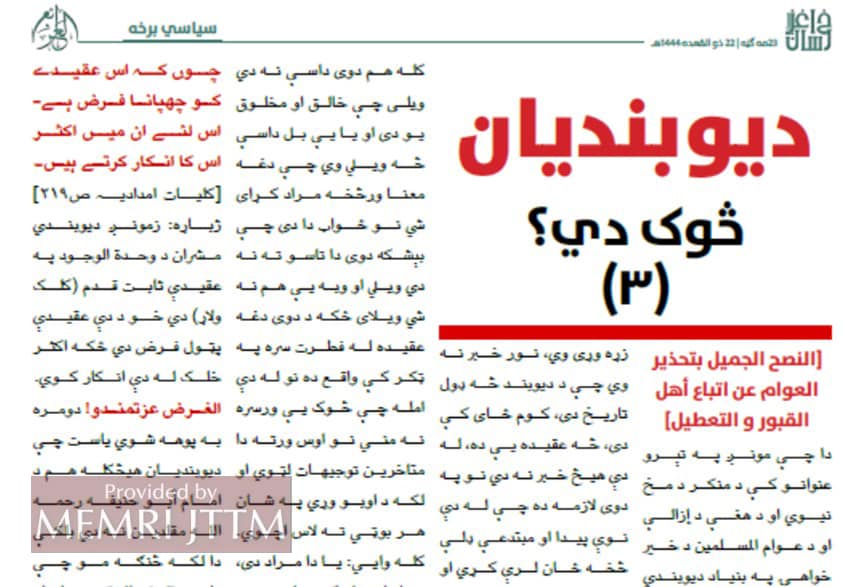
A key article criticizes Deobandi beliefs and practices as polytheistic
The magazine has a third part of a series of articles aimed at criticizing Deobandis, the Islamic religious scholars who adhere to the juristic interpretations of Islam as seen by Darul Uloom Deoband, which is the largest Islamic seminary after Cairo's Al-Azhar University, based near New Delhi. Many Islamic religious scholars in Pakistan and Afghanistan adhere to Deobandi or Barelvi practices.
The article, titled "Who Are The Deobandis (3)," declares Deobandis, based on its own interpretations of shari'a, to be far from Islam. It says that the types of polytheistic practices found in the rival Barelvi school – for example the Balrevi practices performing music and dance at shrines, which Deobandis view as polytheistics – are also found among Deobandis.
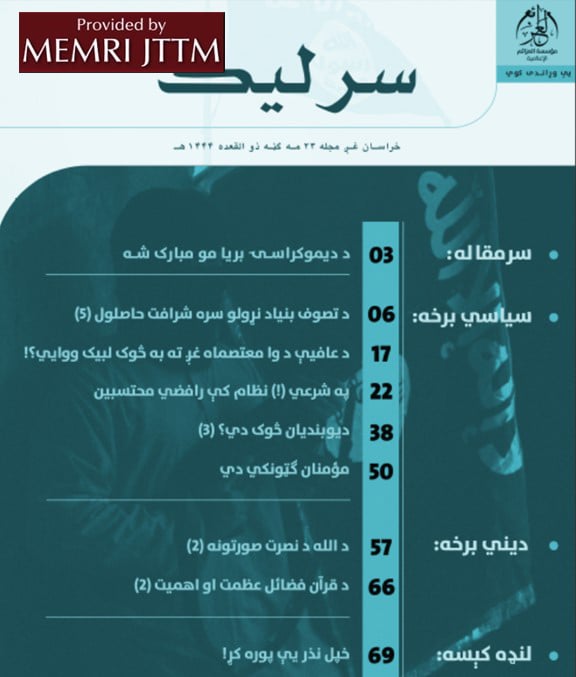
The table of contents of Issue 23
One of the key articles celebrates the mujahideen of the Islamic State (ISIS) as believers. Titled "Momineen [Believers] Are Winners," the article argues that the early period of Islam is repeating itself and that the mujahideen of the Islamic State are going through the same difficult situations as the Muhammad went through.
"The polytheists of this era and their allies are all united against the mujahideen of the Islamic State and they are using whatever force they have against them. Today's unbelievers and their friends are trying to destroy the Islamic system," the article says.
It notes "The efforts of the unbelievers did not damage the Islamic State. At first, the unbelievers thought that they had destroyed the Islamic State, but when the Islamic State won with the help of Allah, the whole world shouted that the Islamic State is a threat to the whole world."
At the end of this magazine, a severe warning has been given to the Afghan Taliban rulers. It says: "Hey Taliban, the mujahideen of the Islamic State are now present in various parts of Khurasan. The coming days will be very bad for you and very sweet for the believers."
The full text of this post is available to subscribers.
Please login or register to request subscription information from MEMRI






